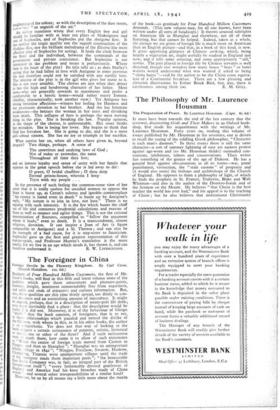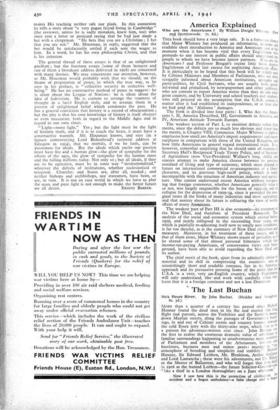The Philosophy of Mr. Laurence Housman
The Preparation of Peace. By Laurence Housman. (Cape. 8s. 6d.1
IT must have been towards the end of the last century that the reviewer, discovering Gods and Their Makers in an Oxford book- shop, first made his acquaintance with the writings of Mr. Laurence Housman. Forty years on, reading this volume of essays published by Mr. Housman in his seventies, one is driven to recall the saying of the riddling Greek philosopher, " Character is each man's daemon." In these essays there is still the same character—a sort of summer lightning of easy yet earnest protest against age-worn and (so Mr. Housman thinks) outmoded con- ventions, inhibitions, taboos and conservatisms. Their writer has something of the genius of the age of Diderot. He has a general brief against obscurantism in all its forms—war, penal punishment, vivisection, the " stale custom " of propriety and (it would also seem) the bishops and archbishops of the Church of England. He opposes to them a philosophy of light, of which he finds the prophets in St. Francis, Traherne, Blake and Walt Whitman—and also in the author of the Deutero-Isaiah and of the Sermon on the Mount. He believes " that Christ is the best teacher the world has ever had," and his appeal is to the teaching of Christ ; but he also believes that institutional Christianity makes His teaching neither safe nor plain. In this connexion he tells a story about "a very pagan friend living in Cambridge" (the reviewer, unless he is sadly mistaken, knew him, too) who once sent a letter or postcard saying that he had just made a bet with a clergyman: " He bets that you are a Christian ; I bet that you are not." Mr. HOusman, in reply, suggested that the bet would be satisfactorily settled if each sent the wager to. him. In a word, he has his own philosophia Christi, and that is his criterion.
The general thread of there essays is that- of an enlightened pacifism • but the fourteen essays (some of them lectures and one of them a broadcast address delivered in 1928) are concerned with many themes. We may concentrate our attention, hbwever, as Mr. Housman would probably wish that we should, on the theme of preparation of peace, to which the true way, as he says in his preface, is " collective security in collective well- being." He-has no constructive method of peace to suggest: he is silent about the League of Nations : he is silent about the idea of federation. He is content to arrange the counters of thought in a lucid English style, and to arrange them in a pattern of enlightened belief which condemns the past. He has a general conviction that history is a record of obscurantism ; but the pity is that his own knowledge of history is itself obscure or even inaccurate, both in regard to the Middle Ages and in regard to our own times.
" Light—more light." Yes ; but the light must be the light of historic truth, and if it is to touch the heart, it must have a constructive warmth. Mr. Housman knows, and says (in a - lecture controverting Lord Birkenhead's rectorial address at Glasgow in 1924), that we mortals, if we be fools, can be passionate for ideals. But the ideals which excite our passion must have fire and a human glow—the glow of sympathy for the efforts of the ages, the glow of sympathy for the human mass and the toiling millions today. Not only so ; but all ideals, if they are to be operative, must be in some way " institutionalised," whatever the defects of institutions, whether ecclesiastical or temporal. Churches and States are, after all, needed ; and neither bishops and archbishops, nor statesmen, have been, or are, in vain. It is not an easy world in which we have to play the man, and pure light is not enough to make the better future



























 Previous page
Previous page